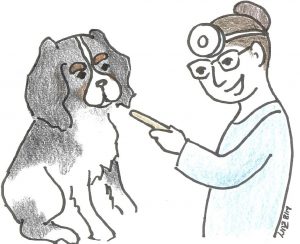 Having a first aid kit and a little basic knowledge about your dog’s health goes a long way should something unexpected happen to your Cavalier King Charles Spaniel.
Having a first aid kit and a little basic knowledge about your dog’s health goes a long way should something unexpected happen to your Cavalier King Charles Spaniel.
Begin by learning to recognize your Cavalier King Charles Spaniel’s normal temperature, pulse, and respiratory rate.
Set up a basic first aid kit for your Cavalier Spaniel puppy. Include these items:
- Dog health record with your pet’s medical and vaccination history
- Phone numbers for your veterinarian and emergency pet clinic
- Rectal thermometer (preferably digital)
- Scissors
- Tweezers
- Gauze bandages and sterile non-adhesive pads
- Antiseptic ointment
- Hydrogen peroxide
- Petroleum jelly
- Syringe
- Small pen light and perhaps a magnifying glass
Temperature, Pulse & Respiration
Your Cavalier King Charles Spaniel’s normal temperature should range from 100 to 102.5ºF or 37.7 to 39.2ºC. Your first aid kit should include a digital rectal thermometer.
Rub it with a little petroleum jelly and insert it about 2 inches into your pet’s rectum. Keep one hand under your pet’s belly so that your Cavalier King Charles doesn’t sit down on the thermometer!
A normal pulse should range from 80 to 140 beats per minute. The easiest place to check your Cavalier King Charles Spaniels pulse is along the femoral artery inside the rear leg, just where the thigh meets the abdomen.
Normal respiration is approximately 15-20 breaths per minute.
Toxic Substances
Cavalier King Charles Spaniels, like most other dogs, will happily put almost anything in their mouth! Unfortunately, a number of households as well as outdoor materials, can be poisonous to your pet.
Call your vet immediately if you suspect your Cavalier may be poisoned. Though dog health problems symptoms can vary, common signs of poisoning include vomiting, convulsions, stumbling, and collapse.
At a minimum, keep your Cavalier King Charles Spaniel away from these common plants and materials:
- Chocolate (theobromine in chocolate is toxic to dogs)
- Apple seeds, cherry pits, and similar items
- Grapes and raisins
- Anti-freeze and pesticides
- House plants including aloe vera, dieffenbachia, dracaena, asparagus fern, rubber plant, schefflera, and poinsettia
- Outdoor plants including azalea, rhododendron, hibiscus, and lily of the valley
Do not give your Cavalier King Charles Spaniel over-the-counter drugs without consulting your veterinarian because common medications such as Aspirin, Tylenol, and Advil, among others, can be dangerous and even poisonous to your dog!
Dr. Sarah’s Tips for Emergency Situations from Life’s Abundance on Vimeo.
The National Animal Poison Control Center, a division of the American Society for Prevention of Cruelty to Animals, is available to answer dog health questions 24 hours a day by phone at 888-4ANIHELP (866-426-4435). (A charge may apply.) Their website has lots of good information.